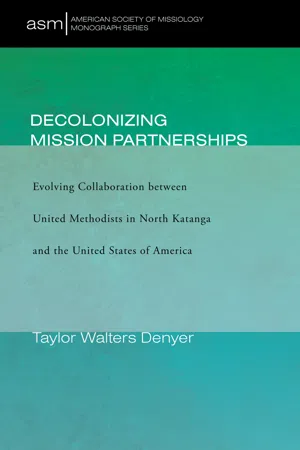![]()
1
Introduction and Research Overview
1.1 Introduction
In 2018, The United Methodist Church’s (UMC) North Katanga Conference celebrated the fiftieth anniversary of its official creation. The history of Methodism in Katanga, DR Congo, dates back further still. In 2010, The UMC’s North Katanga and South Congo Episcopal Areas observed one hundred years of Methodism in the region with a grand ceremony in Lubumbashi and a commemorative book with submissions by both American and Congolese members.
Methodism in Katanga began as a collaboration between American missionaries and Katangan evangelists. Its start is usually marked by the arrival dates of Helen Emily [Chapman] Rasmussen Springer and Rev. John McKendree Springer. Upon hearing of the Springers’ presence in the region, Congolese Methodists such as Kayeka Changand and Kaluwashi returned home from Angola (where Methodist mission stations already existed) to collaborate with the Springers in hopes of spreading Methodism into Katanga. Historian, professor, and American United Methodist (UM) missionary Jeffrey Hoover stresses that these Methodist missions in Katanga “operated on the ground largely through indigenous evangelists and catechists,” but he notes that “indigenous is also a misleading term for many of their African co-workers, a very cosmopolitan group.” That is, the original “indigenous” Methodist evangelists were predominately well-travelled in comparison to those in the communities they were serving. They would have been viewed as returnees, having spent years of their lives living in other countries.
Through the memoirs of John Springer, the official minutes of the denomination’s Congo Mission Conference, the research and writings of Jeffrey Hoover, the oral histories of second-generation American UM missionaries such as Lori Persons and John Enright as well as other missionary memoirs and biographies, much can be said about the early days of Methodism in Katanga as told from the vantage point of American missionaries. The United Methodist Archives and History Center, located at Drew University in Madison, New Jersey, is a repository of many historical photos and other missionary artifacts of Methodism in Katanga. A handful of UM Congolese historians from the South Congo Episcopal Area, with its relative wealth and easier access to computers and printing presses, have also written on the history of Methodism in the region, and a number of student papers are on file in paper format at the library at The UMC’s Katanga Methodist University in Mulungwishi, DR Congo. That said, there remains a dearth of published writings and recorded oral histories on the history of Methodism in North Katanga as told from the perspective of North Katangans.
The relationship between American Methodist missionaries in Katanga and Congolese Methodist leadership has always been complex. The dynamics of this relationship have evolved over the decades—from a colonial mission model, to a nominal partnership, to something yet to be defined and still emerging. This study explores these changes, compares the different points of view on aspects of this relationship, and looks to see what global trends and mission conversations are impacting its trajectory. While the history of The UMC’s South Congo Conference is discussed in the context of the events leading up to the founding of its North Katanga Conference in 1968, this study is focused on the dynamics between the North Katanga Conference leadership and American UMs who have been involved in mission initiatives there.
“Decolonizing Mission Partnerships” was chosen as the title of this study because it seeks to examine a twenty-year period (approx. 1994–2014) during which, according to the assertions of nearly all North Katangans interviewed, a shift took place in terms of a decolonization of how North Katangan church leaders viewed their own capacities relative to those of the American United Methodists they encountered. In the early 1990s, a new eruption of deadly political violence, including pillages, began in the North Katanga region. Foreign missionaries began leaving in waves, with the last holdouts being forced to evacuate in 1998. When the American missionaries and much of the funding for mission station projects in North Katanga left, North Katangans stepped up into full church leadership in terms of identifying mission agendas and contributing to The UMC on the denominational level and in ministry settings in the United States. It was during this period without foreign missionaries that North Katanga began reporting record growth such that it became and remains the largest (in terms of official membership numbers) conference in The UMC.
As is discussed in this study, the eruption of war/violence in Katanga, the evacuation of foreigners, the arrival of cell phones and internet, the coming-of-age of the first generation of North Katangans to earn advanced degrees and travel and serve internationally, the increase in UM membership in Africa and decrease in America, and the escalation of denominational fights over social issues all converged to create a new context where North Katangan and American UMs began to view and interact with each other differently.
1.2 Study Location
While North Katangan church leaders are increasingly traveling in recent years and serving in other countries such as the United States of America (USA), the majority of the history and narratives discussed in this thesis take place within the boundaries of The UMC’s North Katanga Conference. For the sake of clarity, shown below is a map delineating The UMC’s episcopal areas in DR Congo and the bishops who led them in 2016. The North Katanga and Tanganyika Conferences are shown in the section of the map labeled Bishop Ntambo. Bishop Ntambo was the United Methodist bishop over North Katanga, Tanganyika and Tanzania from 1996 until his official retirement in 2016. The area labeled Bishop Katembo (retired) delineates the boundaries of the South Congo episcopal area within the DR Congo. A number of the towns and communities mentioned in chapters 3 and 4 are located in the South Congo episcopal area.
1.3 Research Question
This study s...

